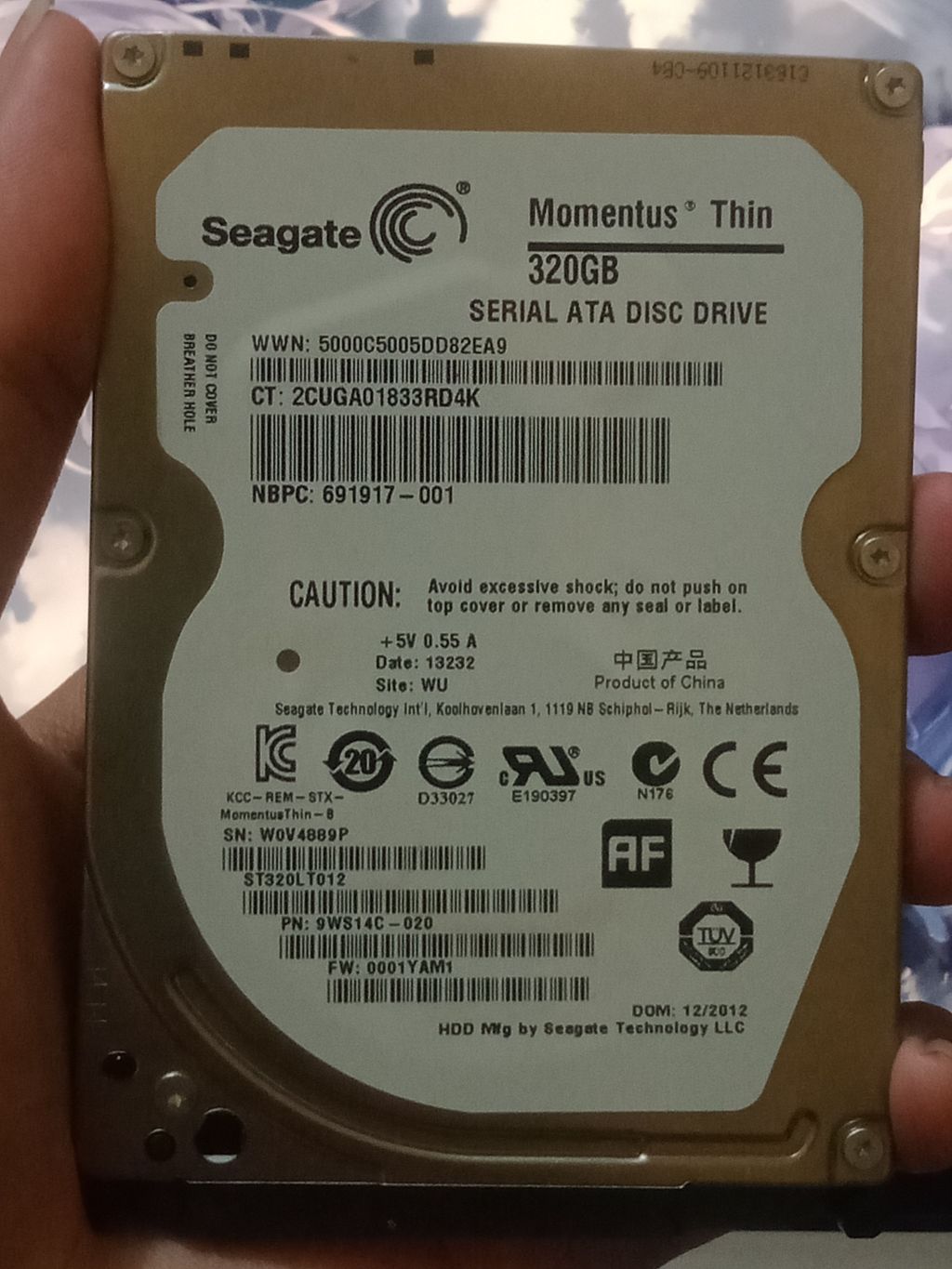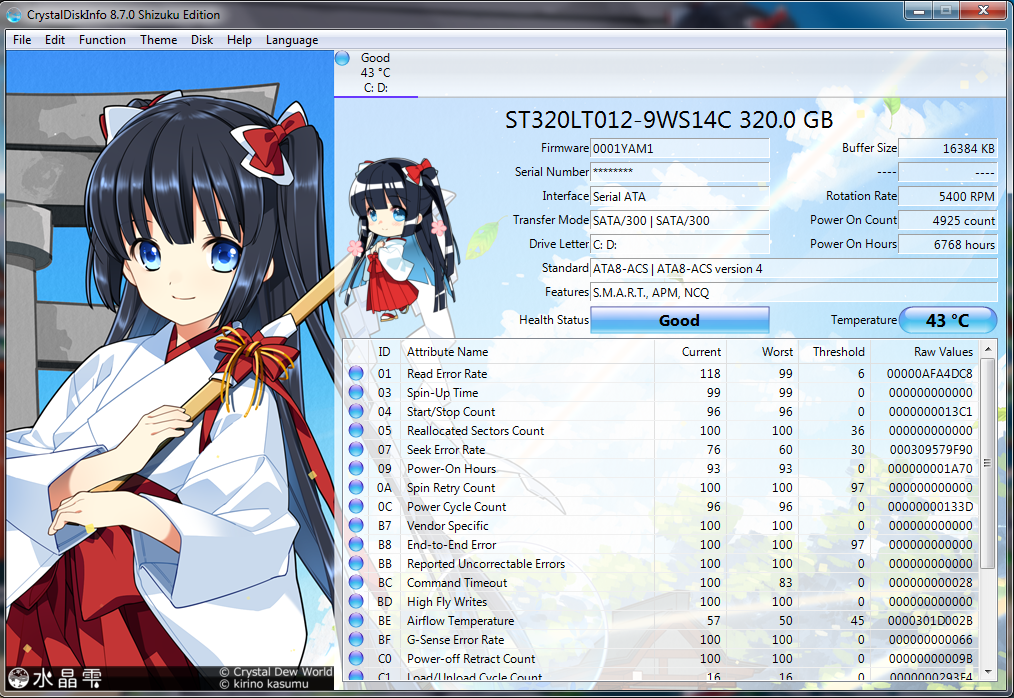Comparing: Seagate Momentus Thin ST320LT012-9WS14C vs KIOXIA KBG40ZNS512G
In this comparison, we analyze two Disks: Seagate Momentus Thin ST320LT012-9WS14C and KIOXIA KBG40ZNS512G, using synthetic benchmark tests to evaluate their overall performance. This side-by-side comparison helps users understand which hardware delivers better value, speed, and efficiency based on standardized testing. Whether you're building a new system or upgrading an existing one, this benchmark-driven evaluation offers valuable insights to guide your decision.

Seagate Momentus Thin ST320LT012-9WS14C
| Type: | Disks |
|---|---|
| Model: | Seagate ST320LT012-9WS14C |
| Capacity: | 320 GB |
| Interface: | SATA-II 3Gbps |

KIOXIA KBG40ZNS512G
| Type: | Disks |
|---|---|
| Model: | KIOXIA KBG40ZNS512G |
| Capacity: | 512GB |
| Interface: | PCIe 3.0 x4 |
Specification Comparison Table
This specification comparison presents technical details of several devices or components to help you understand the key differences between each option. Use this table as a reference to determine which device best suits your needs.
| Specification | Seagate Momentus Thin ST320LT012-9WS14C | KIOXIA KBG40ZNS512G |
|---|---|---|
| Brand | Seagate | KIOXIA |
| Format | HDD 2.5 | SSD M.2 NVMe 2230 |
| Capacity | 320 GB | 512GB |
| Interface | SATA-II 3Gbps | PCIe 3.0 x4 |
Submission Comparison Table
This submission comparison table displays the number and details of benchmark data submissions from various devices or components. This information helps you understand the performance based on the benchmarks that have been tested, as well as providing an overview of the consistency and popularity of the available benchmark results.
| No. | Benchmark Software | Seagate Momentus Thin ST320LT012-9WS14C | KIOXIA KBG40ZNS512G |
|---|---|---|---|
| 1 | CrystalDiskMark |
Read: 84.67 MB/s Write: 83.84 MB/s |
Read: 1930.16 MB/s Write: 1540.12 MB/s |
Submission Comparison Chart
This chart visualizes the benchmark scores comparison between two hardware devices based on submitted data.
Media Gallery
A collection of photos of tested hardware. These images can help you identify the physical form, model, and variant of the hardware in question. These photos are from our own documentation, and if they are not available we may not be able to document them.
About Hardware Seagate Momentus Thin ST320LT012-9WS14C
Seagate ST320LT012-9WS14C is a 320GB capacity hard disk drive (HDD) with a slim 2.5-inch form factor, ideal for laptops, notebooks and other portable systems. Designed using a SATA II (3Gbps) interface and a rotation speed of 5400 RPM, this HDD emphasizes power efficiency and quieter operation compared to higher-speed HDDs.
It uses 1 platter and 2 read/write heads, a common configuration for 320GB capacity, with light weight and low power consumption-suitable for mobile devices. Equipped with 16MB of buffer cache, its performance is sufficient for daily tasks such as saving documents, running light applications, or storing multimedia files.
This Seagate ST320LT012-9WS14C performance test was conducted using an HP 1000 1b05AU laptop that still relies on 4GB DDR3 Single Channel RAM with two DIMM slots. The operating system used during the test was Windows 7 64-bit, which is a typical environment for entry-level laptops in this era of HDD usage. The hardware combination reflects the real usage scenarios of older generation laptop users who still rely on mechanical hard disks as the primary storage medium.
In tests using CrystalDiskMark benchmark software, the Seagate ST320LT012-9WS14C hard disk recorded a fairly stable performance for the 5400 RPM HDD class. The sequential read speed reached 84.67 MB/s, while the sequential write speed stood at 83.84 MB/s. These results show that despite being an older generation HDD with modest specifications, its performance is still adequate for everyday light computing needs such as document storage and media playback.
Although its performance falls short of modern SSDs, the Seagate ST320LT012-9WS14C remains a reliable and cost-effective choice for users who need additional internal storage on older laptops, educational systems, or as external media (with a USB case). Its compact size and low power consumption also make it suitable for use in netbooks and other energy-efficient devices.
Device Test:
Device: HP 1000 1b05au
RAM: 4GB DDR3 Single Channel 2 DIMM
OS: Windows 7
Wednesday, 26 December 2012 14:27:32 | Update: 1 month ago
About Hardware KIOXIA KBG40ZNS512G
The KIOXIA KBG40ZNS512G is a 512GB internal SSD specifically designed to deliver high performance in space-constrained devices such as ultrabooks, mini PCs and compact desktops. It utilizes a PCIe Gen3 x4 interface and supports the NVMe 1.3 protocol, which significantly speeds up system boot time, application loading and data transfer compared to conventional SATA SSDs.
With an M.2 2230 form factor, the KBG40ZNS512G offers an ultra-compact storage solution while remaining powerful in terms of performance. Thanks to the use of the latest generation 3D NAND flash memory from KIOXIA (formerly Toshiba Memory), this SSD is not only efficient in power consumption, but also provides the durability and reliability required for long-term use in a variety of modern computing scenarios.
In performance testing using a Dell OptiPlex 5090 Tower system with an Intel Core i7-11700 processor, 32GB of RAM and Windows 10 operating system, the SSD recorded read speeds of 1930.16 MB/s and write speeds of 1540.12 MB/s through CrystalDiskMark. These results show that the KBG40ZNS512G is capable of handling heavy workloads such as multitasking, large file transfers, and daily productivity activities with a fast and stable response.
In addition to great performance, this SSD also excels in power efficiency, making it an ideal choice for laptops and portable devices that prioritize battery life without sacrificing speed.
Overall, the KIOXIA KBG40ZNS512G is a best-in-class 2230 NVMe M.2 storage solution, combining high speed, compact design, and high reliability, making it a perfect fit for users who require superior performance in a space-constrained device.
Device test (testbed):
Device: OptiPlex 5090 Tower
CPU: i7-11700
RAM: 32GB
OS: Windows 10
Thursday, 01 June 2023 02:29:06 | Update: 1 month ago

